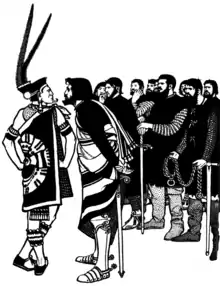Cacamatzin
Cacamatzin (or Cacama) (1483–1520) was the tlatoani (ruler) of Texcoco,[1]:217 the second most important city of the Aztec Empire.
| Cacamatzin | |
|---|---|
 Illustration by Keith Henderson | |
Cacamatzin was a son of the previous king Nezahualpilli by one of his mistresses. Traditionally, the Texcocan kings were elected by the nobility from the most able of the royal family. Cacamatzin's election to the throne in 1515 was said to have been made under considerable pressure from Moctezuma II, lord of Tenochtitlán. Moctezuma II wished to lessen Texcoco's power in favor of greater centralization in Tenochtitlán.
Cacamatzin wrote Cacamatzin Icuic ("Song of Cacamatzin"), invoking his father and grandfather; he seems to protest against Pedro de Alvarado's attack during the festival of Tóxcatl.[2]
Moctezuma II, under orders from Cortés, had Cacamatzin arrested "in his own palace while discussing war-preparations". The Caciques of Coyoacan, Iztapalapa, and Tacuba were also arrested.[1]:262–263
Cacamatzin died during the retreat of Spanish conquistador Hernán Cortés, on the La Noche Triste.[1]:302[3]:90
| Preceded by Nezahualpilli |
Tlatoani of Texcoco 1515–1520 |
Succeeded by Coanacochtzin |
References
- Diaz, B., 1963, The Conquest of New Spain, London: Penguin Books, ISBN 0140441239
- Miguel Leon-Portilla (1978). Trece Poetas del Mundo Azteca [Thirteen Poets of the Aztec World] (in Spanish) (2nd, 1972 ed.). Mexico City: Universidad Nacinal Autonoma de Mexico. pp. 109–125.
- León-Portilla, M. 1992, 'The Broken Spears: The Aztec Accounts of the Conquest of Mexico. Boston: Beacon Press, ISBN 978-0807055014
